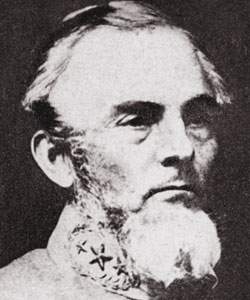Gideon Johnson Pillow (American National Biography)
Scholarship
A moderate on the slavery issue, in 1850 he twice opposed the radicals at the Nashville Convention and supported the Compromise of 1850. In 1852 he vainly sought the Democratic nomination for the vice presidency. He failed in 1856 in a second bid for nomination for the vice presidency, and in 1857 he lost out in a campaign for the Senate.
Except in politics, the 1850s were good years for Pillow, as he expanded his agricultural and political interests into Arkansas and abandoned his law practice. By 1860 he was a very wealthy planter, owning large numbers of slaves and plantations in both Arkansas and Middle Tennessee. He continued to call "Clifton Place," his Maury County plantation, home.
In 1860 Pillow was a Stephen Douglas Democrat, opposed to precipitate action on the part of the South. Following the election, however, Pillow cast his lot with Governor Isham Harris and the Confederacy. In April 1861, two months before Tennessee left the Union, Pillow traveled to Montgomery, Alabama, to vainly offer his services to Jefferson Davis. On 9 May, three days after the general assembly authorized the creation of a Provisional Army of Tennessee, Governor Harris named Pillow to its command with the rank of major general. He accepted the challenge with enthusiasm, arming, accoutering, and organizing into an army the thousands of eager volunteers assembled at Memphis and other camps of instruction.
Except in politics, the 1850s were good years for Pillow, as he expanded his agricultural and political interests into Arkansas and abandoned his law practice. By 1860 he was a very wealthy planter, owning large numbers of slaves and plantations in both Arkansas and Middle Tennessee. He continued to call "Clifton Place," his Maury County plantation, home.
In 1860 Pillow was a Stephen Douglas Democrat, opposed to precipitate action on the part of the South. Following the election, however, Pillow cast his lot with Governor Isham Harris and the Confederacy. In April 1861, two months before Tennessee left the Union, Pillow traveled to Montgomery, Alabama, to vainly offer his services to Jefferson Davis. On 9 May, three days after the general assembly authorized the creation of a Provisional Army of Tennessee, Governor Harris named Pillow to its command with the rank of major general. He accepted the challenge with enthusiasm, arming, accoutering, and organizing into an army the thousands of eager volunteers assembled at Memphis and other camps of instruction.
E. C. Bearss, "Pillow, Gideon Johnson," American National Biography Online, February 2000, http://www.anb.org/articles/05/05-00615.html.
Gideon Johnson Pillow, Military Exploits (American National Biography)
Scholarship
On 14 January 1863 Pillow was relieved of duty with Breckinridge's division and placed in charge of recruiting manpower for the Army of Tennessee as superintendent of the Conscript Bureau for the states of Alabama, Mississippi, and Tennessee. A no-nonsense administrator, he vigorously enforced the conscript law and scoured the countryside rounding up stragglers, arresting deserters, and making enemies. He held this position for more than fourteen months until, at his recommendation in March 1864, he was placed in command of a cavalry force and given the mission of shielding the increasingly vital iron and coal regions of central Alabama against Union raids from their Tennessee Valley bases.
Pillow again led troops into battle in late June, when his small mounted division attacked a brigade of Kentuckians posted at La Fayette in Northwest Georgia. The Confederates' initial success soured when a number of Pillow's men panicked. His failure to cope in mid-July with a raid by Union cavalry that penetrated deep into Alabama finished Pillow as a field commander. He ended his military career as commissary general of prisoners, succeeding to that position upon the February 1865 death of Brigadier General John H. Winder. Paroled at Montgomery on 5 May 1865, Pillow returned to Clifton Place, old for his age, ruined in fortune, and compelled to support himself and his family on his income as a Memphis lawyer in partnership with former Tennessee governor Harris.
Pillow again led troops into battle in late June, when his small mounted division attacked a brigade of Kentuckians posted at La Fayette in Northwest Georgia. The Confederates' initial success soured when a number of Pillow's men panicked. His failure to cope in mid-July with a raid by Union cavalry that penetrated deep into Alabama finished Pillow as a field commander. He ended his military career as commissary general of prisoners, succeeding to that position upon the February 1865 death of Brigadier General John H. Winder. Paroled at Montgomery on 5 May 1865, Pillow returned to Clifton Place, old for his age, ruined in fortune, and compelled to support himself and his family on his income as a Memphis lawyer in partnership with former Tennessee governor Harris.
E. C. Bearss, "Pillow, Gideon Johnson," American National Biography Online, February 2000, http://www.anb.org/articles/05/05-00615.html.



